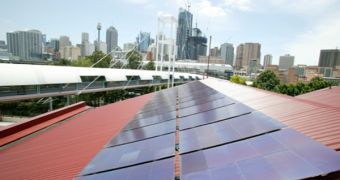Approximately 90 days from now, LA inhabitants will have a chance to look over the plan that will make their city one of the most environmental-friendly on the face of the Earth. The project, called Solar LA, was announced on Monday by Mayor Antonio Villaraigosa, who says that countless solar panels will be installed on the rooftops of commercial and private residences alike, and that these panels will constitute the basis for the renewable energy-powered grid of the city.
"Our solar initiative is the largest of any kind anywhere in the world. When it takes full effect, L.A. will have 1,280 megawatts more capacity – more than exists in the entire United States today," Villaraigosa told a news conference. The financial strain on the citizens of Los Angeles will be negligible, the official says, as, after the project is completed, people will only have to pay an extra $2 on their utilities bills.
The ambitious project is scheduled to be completed by 2014, and it's estimated that it will cost City Hall between $1.5 and $3 billion. Los Angeles Department of Water and Power general manager, David Nahai, says that he is hopeful the solar industry will appreciate the efforts the municipality is making, and that it will offer them a price cut on their purchase. "The L.A. solar plan represents the generation of renewable energy in Los Angeles, by Los Angeles and for Los Angeles," he adds.
Of the planned 1,280 megawatts of energy, 380 are to be obtained from panels installed on citizens' rooftops, who will be able to enter a share-buying program, which will bring them credits, to help them pay their utility bills. A further 500 megawatts of energy are to be collected via utility-scaled solar installations that will feed two city-run power stations. The rest of 400 megawatts will be obtained from panels installed on city-owned buildings.
At this point, 76 percent of all power flowing through the power grid of the city comes from coal and natural gas, a situation that city officials say cannot go on. More and more American cities, and even states, now pledge to rid themselves of their dependency on fossil fuel, and to adopt cleaner solutions for energy production.

 14 DAY TRIAL //
14 DAY TRIAL //